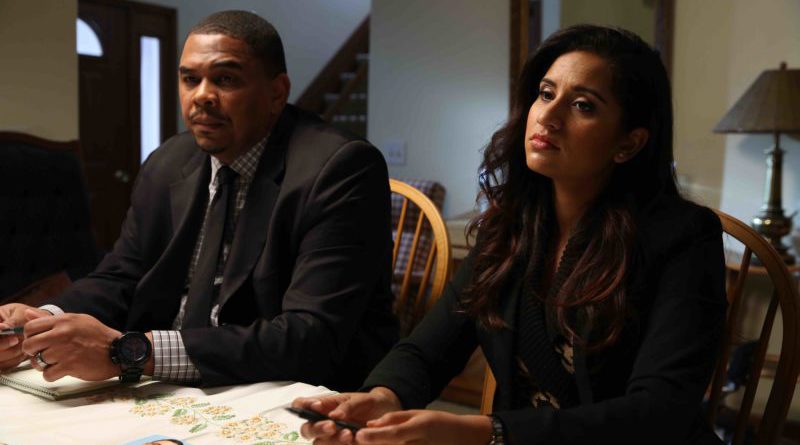INTERVIEWS: ID investigates old homicide cases, in search of ‘Reasonable Doubt’
Photo: Chris Anderson and Fatima Silva reveal the results of the conclusion to the inmate’s loved ones on the season two premiere of Reasonable Doubt. Photo courtesy of Investigation Discovery / Provided with permission.
Investigation Discovery premieres the second season of the hit reality series Reasonable Doubt Wednesday, June 13 at 10 p.m. Homicide detective Chris Anderson teams up with criminal defense attorney Fatima Silva to investigate old crimes in which convicted suspects still maintain their innocence. It’s a long, arduous, sometimes painful process, but Anderson and Silva are determined to gather the facts and ensure justice was properly served.
“It’s going to be fast paced,” Anderson said of the new season. “It’s going to be hard-hitting. … This season we have a lot of hurt families that we try to bring some closure to.”
Anderson, a former detective sergeant, is a retired homicide investigator for the Birmingham Police Department. He was on the job for more than two decades, and during his time, he looked into more than 300 murder cases.
“As a homicide investigator, you always want to think that you have the right person,” he said. “No real homicide investigator, no real police officer wants to wrongfully convict anyone, so every case that any homicide investigator has worked, they really, really think that they have the right person. … In our cases, the problem is within the details.”
For example, on the debut episode, Silva and Anderson look into a 19-year-old who was accused and eventually charged for killing his girlfriend. The Reasonable Doubt team members take up the case and hope to bring some type of closure to all involved, especially the victim’s family.
“You have a confession,” Anderson said of the case. “You have DNA evidence, and you have the victim that is the girlfriend of the suspect. … But when you start unfolding and unraveling the details of that case, your mind is blown by how some of these things are missed. The crime scene within itself is not a crime scene that you would expect to see of a murder of a spouse or a girlfriend or a boyfriend. You just wouldn’t expect to see that.”
A LOOK BACK AT HIS OWN CAREER
Anderson was inspired to join the police because of his mother, who also served as an officer in Birmingham. As a young person, he would look up to his mother and see how she handled the police work. She, on the other hand, wasn’t exactly hoping her son would follow in the same footsteps.
“I always grew up around it because I think she went into police work when I was maybe 8 or 9 years old, I want to say, so I’ve always been around it my entire life,” he said. “But she had a different persona when she put on the uniform rather than the rest of the police officers that I had met. I just saw a different side of police work because I had been around it so much throughout my life that it was appealing to me. It wasn’t something that I always planned on doing, but the opportunity came about. And I took the test, and I scored very high on my test. And then I told my mother, ‘Hey, this is something I kind of want to do. I know I really want to do it now after seeing how well I did on the test.’ She was a little disappointed. She was a little upset because I was supposed to be her college football athlete, so she was the reason that I actually turned to police work. And I’m glad that I did. She actually tried to talk me out of it at first.”
After Anderson joined the force, his career moved quickly. He worked the streets for five years, and then he joined the investigative bureau. Every two or three years, he earned a promotion, and then he made the final jump from the robbery division to homicide.
“It was just a natural progression,” he said. “It was kind of expected, if you will. It wasn’t that hard for me to move over. It was a little unnerving, I guess, for my family because I had young kids, and to be a good homicide investigator, you have to be ready to move at a drop of a hat. You have to be available to keep going as long as you need to, and sometimes that doesn’t work well when you’re a young man with a young family. But I think it was a little bit unnerving, but we handled it. I had a support system, and that was the most important thing.”
By John Soltes / Publisher / John@HollywoodSoapbox.com
Reasonable Doubt returns Wednesday, June 13 at 10 p.m. to Investigation Discovery. Click here for more information.

